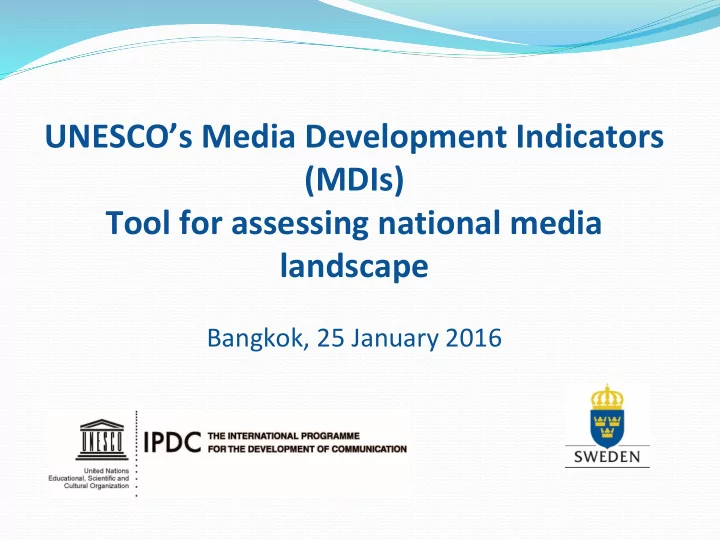

UNESCO’s Media Development Indicators (MDIs) Tool for assessing national media landscape Bangkok, 25 January 2016
Why look at media development? • Potential of media to foster good governance: transparency, accountability, dialogue… • Media development increasingly recognized as integral component of any national development strategy Aim of MDIs: Define framework within which media can best contribute to development and good governance
How were the MDIs developed? Comprehensive study of international systems for evaluation of the media. Reviewed and finalized through an international consultation process involving media development experts from all regions Endorsed in 2008 by UNESCO’s Member States through the International Programme for the Development of Communication (IPDC) Have since gained widespread recognition among media development partners Available versions: English, French, Spanish, Russian, Arabic, Portuguese, Nepali, Chinese and Thai
How are the MDIs structured? Legal and regulatory framework Plurality and diversity of media Media Development Media as a platform for democratic discourse Indicators (MDIs) Professional capacity building Infrastructural capacity
The MDI system MDI 5 x categories 21 x sub-categories 50 x indicators 190 x sub-indicators
MDI strengths in a snapshot • Comprehensiveness • Firmly grounded in international legal standards and good practices • Legitimacy
Completed MDI-based assessments On-going MDI-based assessments Benin* Bolivia Bhutan Brazil Croatia Colombia Curaçao Dominican Republic Madagascar East Timor Ecuador Mongolia Egypt Morocco Gabon Myanmar Jordan Regional project: Croatia, Serbia, FYR Macedonia* Swaziland Libya (partial assessment) Maldives Uganda Mozambique Uruguay Nepal Palestine Somalia (partial assessment) South Sudan Tunisia * The assessments marked in blue are/were not carried out by UNESCO.
Assessing national media landscapes - methodology Partnership with local research institution Literature review, data collection, consultations Multi-stakeholder involvement National validation conference Peer review Follow-up activities
Assessing national media landscapes - Objectives Identify gaps and propose recommendations Assist both State and non-State actors Improve targeting of media development efforts Guide the formulation of media- related policies Roadmap to support the development of free, independent and pluralistic media
Impacts of MDI assessments Contributing to government policy Guiding Supporting media interventions UNESCO by other programme stakeholders MDIs Enhancing Empowering stakeholders dialogue
Thank you www.unesco.org/webworld/en/media- development-indicators
Recommend
More recommend